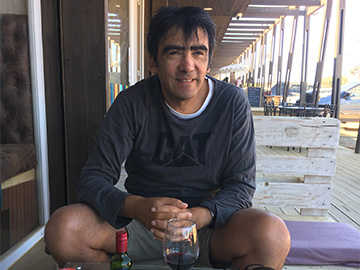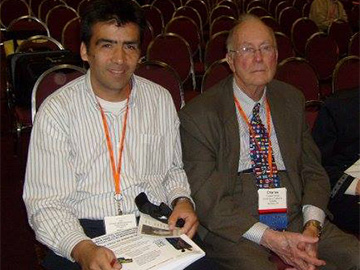
Ignacio Olivares.
For this installment in our Senior Member Insights series, we talk with Ignacio E. Olivares, an associate professor at the University of Santiago de Chile. Ignacio focuses on optical engineering and design of electro-optical instrumentation, including laser diagnostics and laser cavities. He’s authored articles on plasma spectroscopy, Thomson scattering, Doppler-free laser spectroscopy and separation of lithium isotopes.
As he described it to us, much of Ignacio’s education and career has involved designing and building interesting things—beginning with constructing a ruby laser “from scratch” as his Master’s thesis at Pontificia Universidad Católica de Chile. He has continued successfully installing, demonstrating and using advanced laser and optical-trapping equipment through his doctoral work at the Fakultät für Physik und Astronomie, Ruhr Universität Bochum, West Germany, and in subsequent work with the Chilean Nuclear Energy Commission and the University of Santiago de Chile. We talked with him to get some thoughts on how his hands-on approach has shaped his career.
OPN: What paths have you traveled on your career journey that came as a surprise or were unexpected?
An important and unexpected path in my career was teaching experimental courses, mainly optics, at an undergraduate level, and laser spectroscopy at the graduate level. My career changed from a plasma physicist in Germany, to a laser spectroscopy physicist at the Chilean Nuclear Energy Commission, and then to a professor at the University of Santiago de Chile.

Ignacio says a highlight in his career was meeting and talking with Charles Townes in an OSA conference. Other important moments were talking to Norman Ramsey in a Conference in Chile and to Theodor Hänsch in Germany.
OPN: What professional resources do you rely on to stay active and engaged with your field? And what kind of network do you tap?
The most important resources are the reading of articles, the purchase of state-of-the-art instruments and parts, reading OPN and participating in few Optical Society meetings. My network has changed, from my team in plasma physics in Germany to a reduced network of authors in lasers and laser spectroscopy.
OPN: What is one piece of advice that you wish you were given as a student/early in your career?
The main advice is to focus on basic physics, to understand experiments and instrumentation. Also, to read physics and optics new advances as in OPN, Scientific American, Physics Today or other resources. Mainly, to be interested in the work of other students and researchers in conferences or seminars.
OPN: What have you learned by being a mentor to others, and what have you learned from mentors who helped shepherd your career?
Mentoring other students, I learned to teach optics and physics. From my mentors I learned to put my hands on experiments, to analyze experimental situations, to understand articles and to find the “story” in the work we were doing.
OPN: What habits do you frequently rely on that help you to succeed?
I try to organize my work, to ask for help if needed, and to search on the web for details. I look for parts that are as state-of-the-art or as new as possible, if I am trying to solve a complex experimental situation.
OPN: If you weren’t in the sciences, what would be your dream career?
Before I studied physics, I was thinking of being an architect. It was a dream career that included mainly painting and art. I like to work with my hands, and I try to do so when I am in the lab—but not enough! I only like to write programs with MatLab to solve simple problems, including making diagrams.
